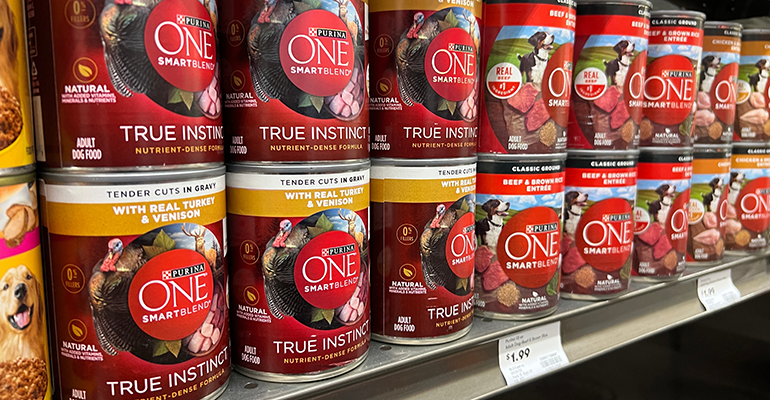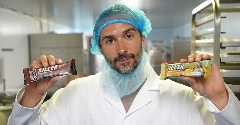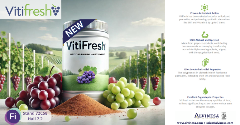News
Nestlé faces US lawsuit for allegedly false advertising pet food as ‘natural’
16 Nov 2023
Legal action has been brought against Nestlé Purina Petcare in the US, after various products were allegedly falsely marketed as ‘natural’, despite containing multiple synthetic ingredients.
Nestlé Purina Petcare, the world’s second largest pet food manufacturer, is facing multiple lawsuits over its labelling of pet food as "natural" when it allegedly contains synthetic ingredients. The class action lawsuit accuses the company of deceptive advertising and misleading consumers into believing that their products are healthier and more natural than they are.

According to the lawsuit, around 70 products labelled as “natural” by Nestlé Purina contain various ingredients recognised as synthetic by the Food and Drug Administration (FDA) such as zinc sulphate, copper sulphate, pyridoxine hydrochloride, menadione sodium bisulphate complex, and xanthan gum. This includes varieties of wet and dry pet foods sold under various brands, such as Purina ONE, Fancy Feast Gourmet Naturals, and Beyond Mixers+.
The class action complaint states that the “defendant’s conduct includes unfair and misleading acts or practices that have the capacity to deceive consumers and are harmful to the public at large”.
The lawsuit also accuses the company’s marketing practices of being “misleading in a material way”, given that the production and quality of the products are “fundamentally misrepresented” by the information provided on the product labels.
Loophole: Lack of legal definition for ‘natural’
The lead plaintiffs in the lawsuits, two pet owners named Adrienne Pietres and Brenda Natoli, argue that the term "natural" has no legal definition when it comes to pet food, and that Nestlé Purina is exploiting this loophole to market its products as healthier and more appealing than they realistically are.
 © AdobeStock/ColleenMichaels
© AdobeStock/ColleenMichaels
“No product labelled ‘natural’ should contain any of these ingredients,” the lawsuit stated. “And yet, the products contain most, if not all of them.”
Had consumers known the products contained synthetic ingredients, they would not have assumed that they were ‘natural’ and would have refrained from purchasing or would be prepared to pay substantially less for them, according to the plaintiffs.
In light of this issue, paired with the rising consumer interest in the health and wellbeing of their pets, the company is facing increasing scrutiny regarding its labelling practices, and may be liable to pay financial relief to the claimants.
Humanisation is driving demand for premium, natural pet food
Over the next five years, the pet food market is expected to grow by close to 5%, Mordor Intelligence predicts. Last year alone, pet owners in the US spent an estimated total of $124 (€116) billion on their pets, around a third of which was spent on pet food.
As pet ownership rises, consumers are more willing to spend more money on food that supports the health and wellbeing of their pets. A 2023 Mintel report found that 45% of pet owners globally are willing to pay a premium for pet food that is made with natural ingredients.
In many markets globally, popular food industry trends such as rising consumer awareness of the link between diet and health, healthy indulgence, and increased demand for clean label, natural, and plant-based products is being reflected in the pet food space. In Asia, pet food launches carrying a no additives or preservatives claim is increasingly steadily, rising by 12% from 2018 to 2022, according to Mintel.
Asian pet food brands are primarily focussing on fortifying products with vitamins and minerals (29%), adding protein (14%), calcium (6%), and fibre (3%).
Related news

Nitrites: Pressure grows on UK to follow EU’s lead
20 Nov 2025
Pressure is growing on the UK to follow the EU’s lead after the bloc revised its regulations on the permitted levels of nitrites and nitrates in cured meats.
Read more
Predictive maintenance redefines powder mixing reliability
13 Nov 2025
Mill Powder Tech's smart control systems harness real-time data to help the food and biotech sectors achieve zero downtime and smarter output, alongside rigorous GMP standards and ambitious ESG goals.
Read more
New UPF standard hoped to offer consumers ‘coherence and clarity’
10 Nov 2025
Ingredients companies are being urged to enter “a new era of partnership and innovation” following the launch of the industry’s first non-UPF verification scheme.
Read more
Ingredient quantities mislabelled on popular protein bars, independent tests show
5 Nov 2025
Some popular protein bars contain more fat, carbs, and/or sugars than claimed on their labels, independent nutrition testing reveals.
Read more
Will postbiotics become the go-to functional ingredient?
3 Nov 2025
Postbiotics show significant promise for the functional foods market due to their safety profile and beneficial bioactive properties, research suggests.
Read more
Will Wicks’ Killer Bar harm the protein bar category?
23 Oct 2025
Joe Wicks’ deliberately dangerous protein bar is fuelling anti-UPF sentiment – but there are concerns that his messaging is misguided and could have unintended consequences.
Read more
EU citizens have high food safety awareness but cost guides purchasing
20 Oct 2025
EFSA’s 2025 Special Eurobarometer report on food safety shows shifting concerns, with cost remaining the primary factor influencing food purchasing decisions.
Read more
Food fraud risks rise as brands fight economic and environmental headwinds
10 Oct 2025
Climate change, geopolitics, regulations, and demand for sustainable products are pushing up food fraud and adulteration risks, warns a world-leading food fraud expert.
Read more
EU proposes delaying anti-deforestation rules by another year
3 Oct 2025
The European Union (EU) plans to push back the already-delayed European Union Deforestation Regulation (EUDR) by another year, citing IT problems.
Read more
Vitifresh: A clean label solution for food protection
24 Sep 2025
Vitifresh, an upcycled grape extract from Spain, offers powerful antioxidant and antimicrobial benefits, extending food shelf life naturally and supporting clean label trends.
Read more